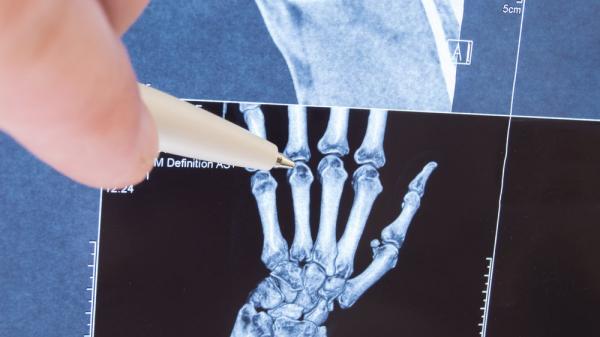
Take the time to find the one that suits you best.
By Mary Anne Dunkin
Choosing a doctor is something we all need to do at different points in our lives. That's especially true when you're dealing with the pain of arthritis. Often the doctor we need is dictated by our condition – and how urgently we need one, says William Buchholz, MD, an oncologist and primary-care physician in Mountain View, CA., who writes and educates about finding doctor-patient relationships that are positive.
“If you have a cut that needs stitches, you just need a technician – any doctor who can stitch the cut and knows to inject Xylocaine.” If you have rheumatoid arthritis, you need a rheumatologist, because a chronic condition may require a lifetime of medical treatment and expertise and technical competence aren’t always enough.
Is a good doctor for one person always the right doctor for another? Not necessarily, says Edward Krupat, PhD, a Harvard Medical School psychologist whose research has focused largely on the unique nuances of the doctor-patient relationship. Just because a doctor is “good,” doesn’t mean they're right for you. Be it a shared religious belief, common interests or intangible qualities that attract good friends, for some legitimate – and some inexplicable – reasons certain patients just seem to click with certain doctors.
Doctors feel it, too. “There are some people that you just click with immediately and you know it’s going to be a wonderful match,” says David Watts, MD, a San Francisco physician, poet and regular commentator on National Public Radio’s “All Things Considered.” “Then there are others you just can’t click with, so you just do the best you can.”
Krupat’s fascination with what makes some doctors and patients click began with a personal experience 33 years ago. He and his wife had just moved to Boston and had made same-day appointments to see the same doctor. That evening, at home, the two compared notes and discovered vastly different perceptions. “She said he was great and that she was looking forward to seeing him [again],” Krupat recalls. “I said, ‘That’s funny, because I’ve already called and asked for another doctor.’”
While the doctor was in control, comforting and reassuring with both Krupat and his wife, the two saw him differently, simply because their own needs and expectations were different. “Whatever she asked about, he was very reassuring and that was what she needed,” he says. Krupat, on the other hand, was put off by the physician’s paternal style. “I needed information and he wasn’t anxious to give it to me.” The next doctor he found was more forthcoming with information.
Benefits come with good relationship
Add to the equation this research finding: Doctor-patient studies show a positive relationship based on individual needs can pay off in long-term health benefits.
Doctors at the New England Medical Center’s Institute for the Improvement of Medical Care and Health in Boston analysed data from four clinical trials conducted in practice settings with patients from widely varied socioeconomic backgrounds. They found that better health - measured by blood pressure or blood sugar, functional status, or subjective evaluations of overall health status- was consistently related to the quality of the doctor-patient relationship.
“There are several studies that show if the patient feels they have a good relationship with the doctor, blood pressure management is easier, frequency and thus cost of visits is reduced, pain control is more successful, and the number and cost of medications to keep the patient’s condition under control is reduced,” says Dr. Watts.
“In general, a good doctor-patient relationship is one where there is mutual respect and understanding,” says Dr. Watts. “Certainly in emergencies -- a stabbing or a stroke, for example -- the doctor has to behave as an authority to save lives. But most of the time, we don’t have the pressure of immediate decision making.” Instead, he says, the doctor must work in partnership with the patient, and vice versa.
“This goes contrary to the teaching of most medical students,” says Dr. Watts, “but a good doctor-patient relationship is very much like a good friendship.” That friendship, he says, allows the doctor to talk to the patient about lifestyle issues -- such as quitting smoking or losing weight -- from a position of caring, not solely as a doctor.
Mary Lou Bayer of Pittsburgh, PA., knows this well. The 41-year-old has had osteoarthritis (OA) -- and the same doctor to treat it -- for 17 years. “He managed to get me to quit smoking after 23 years and has me halfway through a weight loss of 50 pounds.” Both changes, she says, have brought improvements to her OA as well as her general health.
Patients who feel at ease talking with their doctor, research shows, are more likely to comply with the doctor’s recommendations, and take prescribed medications, compared to patients who clam up in the examining room. Maura Daly Iversen, a physiotherapist and an instructor of medicine at Brigham and Women’s Hospital in Boston, has observed this firsthand, teaching patient-provider communication. She has also witnessed it with her teenage daughter, Christina, who has juvenile rheumatoid arthritis.
Early in the course of her daughter’s disease, Iversen sought a doctor who was considered to be the top expert in the field. It didn’t take long to discover the best expert wasn’t necessarily the best fit. The next doctor they chose, however, was just what her daughter needed. “When I take her to the doctor now, she kicks me out of the examining room. Her doctor can elicit information about everything,” says Iversen. “Christina is very adherent to her treatment plan. I don’t even have to remind her to take her medicine any more.”
Following your doctor’s “orders,” such as remembering to take your medication or following a recommended treatment plan, can mean the difference between healthy joints and damaged ones, between remaining mobile and becoming disabled.
But what about a doctor who follows a patients’ orders or expectations? Both parties’ expectations play an integral role in this relationship’s dynamic.
Doctor-patient dynamics
Like any relationship, the doctor-patient dynamic is based on meeting needs - and expectations - on both sides. In the case of the cut requiring stitches, the need is simple and clear -- and the expectation mutual -- to have the cut stitched with as little pain and scarring as possible. The patient’s expectation is that the doctor is competent to provide safe and proper treatment. If he pulls it off, a patient will likely consider him a “good” doctor.
But when a patient is choosing a doctor for arthritis, needs may be numerous and expectations may range from basic to grandiose. You may expect your doctor to know how to minimize joint erosions, avoid joint surgery and improve mobility -- all without risk of side effects. Or you may merely expect a prescription to help you through a flare.
And your needs and expectations may change depending on the urgency of the situation. For example, a patient who normally takes charge of her own health care may seek more guidance when faced with an unfamiliar and frightening complication. This patient may need her doctor to be a counselor on one visit or simply a confidante on another.
If your needs and expectations go unmet, you can leave disappointed, frustrated and feeling like your doctor is a dud. To avoid such situations, Iversen suggests taking time to evaluate your needs and expectations of your doctor. Then go to the doctor with a clear idea of your expectations, and make them clear to your doctor.
Ironically, the best antidote to having unmet needs yourself is to ensure you meet your doctor’s needs. While the doctor who sews your cut may need little more from you than to sit still and pay your bill, a doctor who treats arthritis needs extensive input from you and that requires trust - a key component in the doctor-patient dynamic.
A trusting relationship with your doctor requires feedback and at times uncomfortable self-disclosure. Have you been exercising as recommended? Are you taking herbal remedies or trying other alternatives your doctor might not condone? Does a weakness for Cheetos or Twinkies make it difficult to stick to the diet he or she recommended? And most important, what are your treatment goals?
“Good communication is the most important part of the doctor-patient relationship,” says Dr. Buchholz. “Both parties need to be able to clearly communicate their goals.”
Should you go so far as to tell your doctor you enjoy moonlit strolls on the beach? Perhaps, if keeping your arthritic knees in shape so you can continue those strolls is a priority.
Dixie Byers, 57, of Emmanus, IA, can attest to that. “My doctor and I have a very good rapport, but it wasn’t always that way,” she says. “In the beginning, he just didn’t stop to listen to what I was saying about how I felt or to answer questions about my medicines.”
But as time progressed, the relationship evolved and both parties changed. Byers, who has both RA and multiple sclerosis, learned to ask for what she needed. “I told him, ‘I need more information from you. I need to know what’s ahead for me.’” She also began conducting her own research on the Internet. She took the information to him and wrote down questions she wanted to ask him. Byers became more involved and more assertive. As a result, she found her doctor started to listen and work more with her.
“Most doctors appreciate a patient who is informed and involved,” says Krupat. Research shows patients with a chronic disease who take a role in their day-to-day care fare better than more passive patients. If being involved is important to you, let your doctor know and do your homework. If your doctor discourages you or is unresponsive, it may be time to shop for another doc.
There are many ways to find a new doctor. Word-of-mouth is an excellent resource. Ask around. Friends in your arthritis support group or exercise class are great sources. But remember, the best doctor is nearly always in the eyes of the beholder – one size does not fit all. Think for yourself and make your own informed decision.
You may also check with your insurance company when choosing a doctor. Increasingly insurers are compiling information about doctors other than just their educational background and office hours. At least one major managed health care plan, Kaiser Permanente, provides a statement concerning a doctor’s treatment philosophy or communication style, as well as a personality scale for doctors and patients, to help patients find a good match.
While Krupat suspects personality scales can one day help people find compatible doctors - after all, they’ve helped people find dates and spouses - they can’t take the place of a face-to-face meeting or the thrill of knowing you’ve found someone you can count on for the long haul.
What to look for in a doctor
Regardless of your personality, you should always seek a doctor who has the three Cs -- competence, communication and compassion -- says William Buchholz, MD, oncologist and primary care physician in Mountain View, CA. You must be confident your doctor knows what they're doing, can convey the information and instructions you need and cares about your well being, says Dr. Buchholz. Other qualities you’ll want in any doctor include:
Experience treating your condition. The more experience your doctor has with your condition, generally, the more adept they will be at recognizsng and treating it. For example, a doctor who has little experience with fibromyalgia might not be as quick to make a diagnosis and prescribe effective treatment as one who’s spent a lot of time with such patients.
Up-to-date knowledge. Your doctor may have the bedside manner of Marcus Welby, MD, the benevolent 1970s TV doc, but they should be up to date on the research and techniques. Arthritis research advances continuously. Make sure your doctor is on top of the latest studies so they can provide the best care.
Accessibility. A doctor who can’t see you for two weeks or doesn't return calls when you’re in the midst of a medication reaction or a flare can make you feel like a second-rate patient.
Willingness to fight. A good doctor will go to bat for you with your private health insurance company if they don’t want to cover a specialist referral, surgical procedure or medication they've recommended.
A solid office staff. Your doctor may be wonderful, but if office staff lose your phone messages, delete your emails, fail to do what they say they will or treat you rudely when you call or visit, consider looking elsewhere, says Dr. Buchholz.











